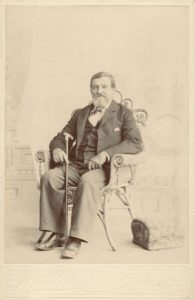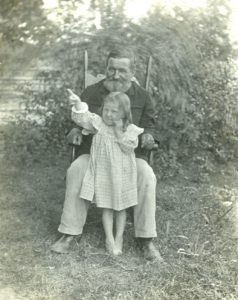
Robert Gough, was born in Manchester, England, 30 miles south of Barrowford. Robert continued in his father’s occupation as a coal miner. His wife, Elizabeth Brown, was born in Barrowford, England. Barrowford was a center of the cotton trade in England in the early 19th century. The family lived on Lloyd Street in Manchester. Elizabeth worked for a while in a silk factory.
Robert Gough and Elizabeth Brown were both 20 years old when they were married in the Manchester Cathedral, in Manchester, Lancashire County, England, on July 15, 1842 (then known as the “Owd Church”). The couple remained in England for about 12 more years before emigrating to this country. Robert and Elizabeth had 12 children, some born in England, and some in this country. Unfortunately they lost several children in childhood; only five lived into adulthood. Their youngest child was Nancy “Nannie” Alice Gough (1866 – 1953), born when the parents were 44 years old.
The Gough family left England from Liverpool on the ship Lone Star, and arrived in Philadelphia on June 13, 1854, after a difficult voyage across the Atlantic. They traveled with their oldest son, Edward, then 8 years old, and an infant who later died. Their daughter, Anna, age 5, did not accompany them on the voyage. She may have traveled later with Robert’s half-brother Edward, but this has not been confirmed. After Robert and family arrived in the United States, they settled first in Livingston County, Kentucky, and moved to Boonville in 1858.
Robert Gough wrote a letter that survives from Kentucky in 1856 to his parents and siblings back in England. He talks about the hard life of coal mining in Kentucky, how dependent he is on the river to transport the coal he digs from the ground: if the water is too low, or frozen, he is without work. Still, he says that food and drink are much more readily available here than in the old country, and expresses that he, and especially Betty, are committed to staying in the U.S.
Robert also writes about news he has heard about his brother, George Gough, who had just returned to England from a tour of duty with the British military during the Crimean War (1856-1858). He writes that his brother was fortunate enough to be stationed in Malta, which served as a staging area for supply and military missions to the Black Sea, and was fairly peaceful. Robert says he hopes that George has satisfied his desire for military duty, and that “we hope that he will be like the song says let those that make the quarrells be the only men to fight.” Ruth Wilson Mullins was quite close to her Granddad Gough, and they were kindred spirits: Ruth was a peaceful sort of person.

Robert Gough was one of the earliest developers of coal mines in Warrick County, and Ruth recalls that the first small mine was in the wooded pasture at her Aunt Mary Gough Nester’s house. The men would dig into the ground with picks and shovels to uncover a shallow vein of coal, making small tunnels, and hauling the coal out with a mule drawn cart. As the mines were abandoned they became little grassy knolls that Ruth recalls were fun places to play.
Robert and Elizabeth Gough’s oldest child was Edward Gough (1846-1928). He was a schoolteacher in Warrick County, from age age 20 in 1866. A history of the Warrick County School system notes that he was a second grade teacher in 1870-1871. He was also the only Wilson or Gough from Boonville for whom there is confirmed military service during the Civil War. He served in the Indiana 136th Infantry Regiment (Union Army) that was formed in Indianapolis on May 21, 1864. This regiment was ordered to Tennessee to serve as Railroad Guard in Tennessee and Alabama. It was in existence only for 100 days, mustered out on September 2, 1864. The regiment lost 8 men during this time from disease, but none from hostile action. These were typical statistics for Civil War regiments: there were often more deaths from disease than from battle.
Boonville did not suffer any physical damage during the Civil War. In fact there was only one battle in the entire state of Indiana during the war, at Corydon, on July 9, 1863, about 60 miles east of Boonville.
At some point after 1871, Edward Gough became a judge of the Warrick County circuit court. He is noted to have made a number of speeches in Boonville over the years, including one on Saturday, April 13, 1917, on the occasion of a patriotic parade and ceremony marking this country’s entry into the war in Europe.
© 2013 W. Mullins
